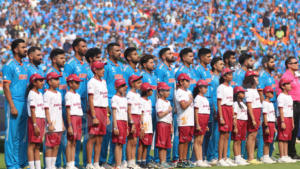
RevSportz Comment
Every self-anointed new-age guru, especially those that love to spew nonsense on social and professional platforms, is familiar with the words. They wouldn’t be able to tell you a thing about Vince Lombardi or his incredible achievement of making the small town of Green Bay the centre of the American Football universe, but the PowerPoint presentations and motivational speeches will constantly reference what Lombardi said more than half a century ago – “Winning isn’t everything, it’s the only thing.”
Here’s what we need to understand. Lombardi, like Bill Shankly, the other coaching visionary of that age, said a lot of things for effect. Things that made for good locker-room slogans and pre-game speeches. If you read the wonderful When Pride Still Mattered: A Life of Vince Lombardi, by David Maraniss, you’d understand that Lombardi was a complex and thoughtful figure whose coaching philosophy borrowed from the armed forces, religion and other aspects of the world around him.
Unfortunately, in the years since he said those words, they have been used to fetishise victory to an unhealthy extent. Winning isn’t everything. How you played the game matters just as much. After India lost the World Cup final to Australia on Sunday night, Narendra Modi, India’s Prime Minister, went into the bowels of the stadium to console the players. Heads of state have far more important things to occupy them than sporting streaks, yet even Modi remembered to mention the 10-match winning run that India had put together.
Australia were deserving winners of the World Cup, but every so often, major tournaments can be won by teams who are nowhere near being the best. Even the hardcore football geek would be hard-pressed to identify more than two or three players from the Greece side that won Euro 2004, when both the Czech Republic and the Netherlands had teams that were far easier on the eye.
If you want to go back even further, grown men and women now in their 50s and 60s still shed tears about the Brazilian side of 1982, dumped out by a Paolo Rossi hat-trick for Italy on the ‘day football died’. Brazil scored 15 goals in their five matches, and as long as the World Cup is played, at least three or four of them will always be part of the Greatest Goals collection.
If you look at football today, with Manchester City setting the standard for the rest, there is a clear coaching thread that links Pep Guardiola with the late Johan Cruyff and Rinus Michels. Michels, widely considered one of the pioneers of Total Football, and Cruyff, who executed his plans on the field with matchless grace, never won a World Cup, losing 2-1 to West Germany in 1974.
Two decades earlier, West Germany had triumphed in another final in Berne, against another team whose tactical innovations influenced football for decades. Hungary’s Magic Magyars were on a 32-match unbeaten run before that 3-2 final defeat, but the beauty and precision with which they played their football – 6-3 and 7-1 victories over England being highlights – has ensured that they will never be forgotten.
Sachin Tendulkar knows the pain of losing a World Cup final in a tournament in which he finished as the leading run-scorer. He tweeted after the Ahmedabad defeat of how “just one bad day in an otherwise sterling tournament can be heartbreaking”. But there are millions of Indian cricket fans who remember that 2003 team with so much fondness. No one who watched it will ever forget Tendulkar 98 off 75 balls against Pakistan at Centurion, especially that six he cut behind square off Shoaib Akhtar. The pistol crack of bat on ball still echoes through the years.
Once the emotions settle down, fans will recognise just how fortunate they were to watch this Indian team over the past six weeks. Rohit Sharma’s dash at the top of the order, Virat Kohli’s mind-boggling consistency, the incredible accuracy of Mohammed Shami and Jasprit Bumrah, and Kuldeep Yadav’s trickery. They failed at the last, but the verve and imagination with which they played those ten games deserves to be remembered. And in time, it will be.
In Brilliant Orange, one of the best books ever written on sport, David Winner wrote: “Johan Cruyff was the first player who understood that he was an artist, and the first who was able and willing to collectivise the art of sports.” This Indian team played as though they understood that. Amid so many reports of the imminent demise of 50-over cricket, they batted, bowled and fielded as if aware that their duty was not only to win, but to captivate and entertain.
That matters. As Socrates, captain of that unforgettable Brazilian team of 1982, once said: “Beauty comes first, victory is secondary. What matters is joy.”